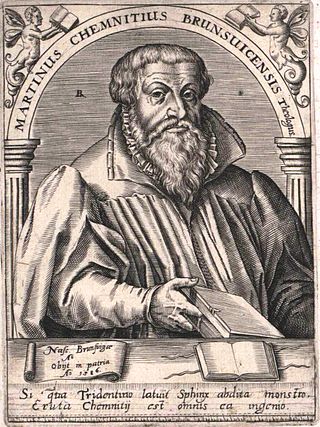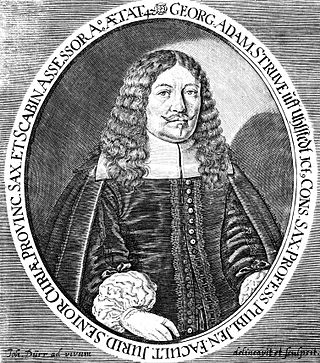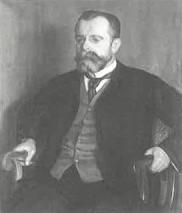Related Research Articles
Matthias Weckmann (Weckman) (c.1616 – 24 February 1674) was a German musician and composer of the Baroque period. He was born in Niederdorla (Thuringia) and died in Hamburg.

Holzminden is a town in southern Lower Saxony, Germany. It is the capital of the district of Holzminden. It is located on the river Weser, which at this point forms the border with the state of North Rhine-Westphalia.

Martin Chemnitz was an eminent second-generation German, Evangelical Lutheran, Christian theologian, and a Protestant reformer, churchman, and confessor. In the Evangelical Lutheran tradition he is known as Alter Martinus, the "Second Martin": Si Martinus non fuisset, Martinus vix stetisset goes a common saying concerning him. He is listed and remembered in the Calendar of Saints and Commemorations in the Liturgical Church Year as a pastor and confessor by both the Evangelical Lutheran Church in America and Lutheran Church–Missouri Synod.
The 17th century organ composers of Germany can be divided into two primary schools: the north German school and the south German school. The stylistic differences were dictated not only by teacher-pupil traditions and international influences, but also by separate organ building traditions: northern organs tend to have a tower layout with emphasis on the pedal division, while southern and Austrian instruments are typically divided around a window and emphasize manual divisions.

Harald Vogel is a German organist, organologist, and author. He is a leading expert on Renaissance and Baroque keyboard music. He has been professor of organ at the University of the Arts Bremen since 1994.
Philipp Dulichius was a German composer.
Manfred Cordes is a German conductor of early music, musicologist and teacher. He is professor at the Hochschule für Künste Bremen and was its rector from 2007 to 2012.

Sophie or Sophia Hedwig of Brunswick-Wolfenbüttel was a princess of Brunswick-Wolfenbüttel by birth and by marriage a Duchess of Pomerania-Wolgast.

Andreas Angelus was a German clergyman, teacher and government inspector, known for his chronicles of the history of the Margraviate of Brandenburg.
Hans Jantzen was a German art historian who specialized in Medieval art.
Paul Francke was a German Renaissance architect, most notable as director of works for the Duchy of Brunswick-Lüneburg from 1564 until his death in 1615. His works include the Juleum Novum in Helmstedt, the Marienkirche in Wolfenbüttel and the Burganlage in Erichsburg.
Walther Hermann Vetter was a German musicologist. From 1946 to 1958, he was professor at the Humboldt University of Berlin.

Kurt Gudewill was a German musicologist and University lecturer. From 1952 to 1976 he was professor at the musicological institute of the Christian-Albrechts-University of Kiel. He rendered outstanding services to Heinrich Schütz and Lied research.
Thomas Synofzik is a German musicologist. He is director of the Robert Schumann House in Zwickau.
Walther Killy was a German literary scholar who specialised in poetry, especially that of Friedrich Hölderlin and Georg Trakl. He taught at the Free University of Berlin, the Georg-August-Universität Göttingen, as founding rector of the University of Bremen, as visiting scholar at the University of California and Harvard University, and at the University of Bern. He became known as editor of literary encyclopedias, the Killy Literaturlexikon and the Deutsche Biographische Enzyklopädie.

Georg Adam Struve was a German legal scholar, university professor of Jurisprudence and prolific author of legal texts.

Erich Marcks was a German historian.
Johannes Piersig was a German Kantor, docent for organ playing, music education and music theory, and later in 1979/80 rector of the Free University of Hamburg.
Christoph Treutmann ), also Christoph Treutmann der Ältere unlike his son of the same name, was a German organ builder of the Baroque period. He learned in Magdeburg from Heinrich Herbst and also founded his own workshop there. His most important surviving work is the great organ of the Stiftskirche Grauhof.
References
- ↑ Dobbs, Benjamin. "Gewesener Magdeburgische Musicus: Examinations into the Stylistic Characteristics of Heinrich Grimm's Eight-Voice Motet, Unser Leben wehret siebenzig Jahr'." MM thesis, University of North Texas, 2010.
- ↑ Lorenzen, Hermann. "Der Cantor Heinrich Grimm (1593-1637): sein Leben und seine Werke mit Beiträge zur Musikgeschichte Magdeburgs und Braunschweigs." Ph.D. dissertation, Universität Hamburg, 1940.
- ↑ Carter, Joanna. "A Study of Two Seventeenth-Century Teaching Manuals in Hamburg: Critical Editions and Translations of Thomas Selle's Kurze doch gründtliche Anleitung [sic] zur Singekunst (c. 1642) and Heinrich Grimm's Instrumentum Instrumentorum, hoc est, Monochordum vel potius Decachordum (1634)." Ph.D. dissertation, Florida State University, 2002.
- ↑ Synofzik, Thomas. "Heinrich Grimm (1592/93-1637): "Cantilena est loquela canens." Studien zu Überlieferung und Kompositionstechnik." Ph.D. dissertation, Universität Köln, 1998.
- ↑ Reipsch, Ralph-Jürgen. Heinrich Grimm (1593-1637): Kantor—Komponist— Theoretiker. Magdeburg: Stadt Holzminden, 1993.
- ↑ Synofzik, Thomas. "Heinrich Grimm (1592/93-1637): "Cantilena est loquela canens." Studien zu Überlieferung und Kompositionstechnik." Ph.D. dissertation, Universität Köln, 1998.